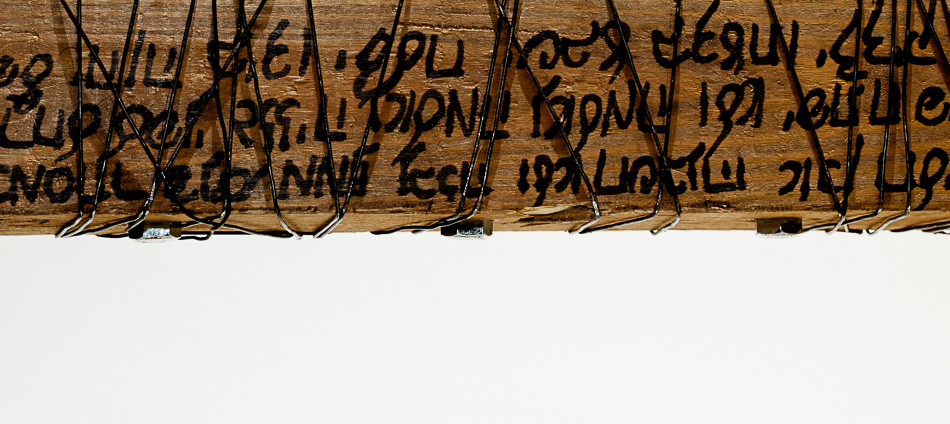The translation of the Hebrew title of this piece is "Prison of Love." The wooden frame of the piece, made of cedar 4x4s, was built to give a few more inches of height to my dad's lift chair which he used while he was at home during his decline due to ALS (which he passed away from in Sept of 2017). The frame and the bars are meant to invoke a prison window, and the wires are meant to represent the tension, intricacy, and complexity that is involved while loving someone through a difficult time/situation/etc.
Working as a hospice chaplain, I see family members and friends do this for their loved ones all the time: by making the choice to be a caregiver for someone on hospice often requires that people choose a "prison of love" in order to do so. This prison that people choose is difficult, but it is also full of beauty as they love those they care deeply for through all the difficulties and challenges that care giving brings. The 'prison' is true in every sense of the word as many times care giving necessitates that the caregiver either severely limit or completely give up their ability to be away from the care giving location. This can also be applied to many other life situations, including being a parent to a small child who is still fully dependent.
In the detail photos below, note that the wires were pulled hard enough that they've pressed into the wood: this was done on purpose as a symbolic representation of the wear and tear that gets put on caregivers bodies both physically and emotionally. The piece was quite back-breaking to make, and I put such tension on my hands in pulling the wire that despite wearing gloves my hands hurt enough after doing the piece that even running water over them was painful.
There are some parts of the black wires that are polished silver, and a single red wire running through the piece - these are meant to invoke the beauty of the struggle of love.
This piece was created as a part of the Advent Art Series at Awaken in St. Paul and so has theological meaning as well. The seven bars and the seven bolts on top of the piece represent completeness and perfection as it does throughout the Hebrew Bible and New Testament, and the three bolts on the bottom (see detail below) are meant to symbolize the Trinity - Father, Son, and Holy Spirit. These three bolts are on the base of the work as the Trinity in Christian theology is the basis for love and creation. The central word on the piece is "'Immanuel," (which means "God with us") and the text around the piece is Isaiah 53, the Suffering Servant passages which Christian theologians believe point to Jesus as that servant, come to this world in love to give himself as a sacrifice for all.
The piece is 30" x 30".
Working as a hospice chaplain, I see family members and friends do this for their loved ones all the time: by making the choice to be a caregiver for someone on hospice often requires that people choose a "prison of love" in order to do so. This prison that people choose is difficult, but it is also full of beauty as they love those they care deeply for through all the difficulties and challenges that care giving brings. The 'prison' is true in every sense of the word as many times care giving necessitates that the caregiver either severely limit or completely give up their ability to be away from the care giving location. This can also be applied to many other life situations, including being a parent to a small child who is still fully dependent.
In the detail photos below, note that the wires were pulled hard enough that they've pressed into the wood: this was done on purpose as a symbolic representation of the wear and tear that gets put on caregivers bodies both physically and emotionally. The piece was quite back-breaking to make, and I put such tension on my hands in pulling the wire that despite wearing gloves my hands hurt enough after doing the piece that even running water over them was painful.
There are some parts of the black wires that are polished silver, and a single red wire running through the piece - these are meant to invoke the beauty of the struggle of love.
This piece was created as a part of the Advent Art Series at Awaken in St. Paul and so has theological meaning as well. The seven bars and the seven bolts on top of the piece represent completeness and perfection as it does throughout the Hebrew Bible and New Testament, and the three bolts on the bottom (see detail below) are meant to symbolize the Trinity - Father, Son, and Holy Spirit. These three bolts are on the base of the work as the Trinity in Christian theology is the basis for love and creation. The central word on the piece is "'Immanuel," (which means "God with us") and the text around the piece is Isaiah 53, the Suffering Servant passages which Christian theologians believe point to Jesus as that servant, come to this world in love to give himself as a sacrifice for all.
The piece is 30" x 30".








No comments:
Post a Comment